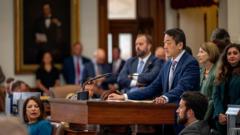The House of Representatives initiated the final voting process for President Trump's extensive domestic policy legislation. Following a crucial period of negotiations, Speaker Mike Johnson managed to unite Republican support against preceding conservative resistances that had jeopardized the bill.
In a day filled with political maneuverings, Johnson presented the legislation as a means to bolster safety and prosperity for all Americans. Meanwhile, Democrats sought to delay the vote throughout the day, with House Minority Leader Hakeem Jeffries breaking the record for the longest floor speech at just under nine hours. In his fervent address, he criticized the bill as a "disgusting abomination" jeopardizing healthcare for millions reliant on Medicaid, voicing the concerns of adversely affected constituents.
With slim margins essential for passage, Republicans were forced to contend with skepticism and calls for deeper fiscal cuts. Despite initial dissent from fiscal conservatives over the bill’s extensive tax cuts, which amounted to $4.5 trillion, many members eventually shifted their stance under Trump’s influence. Some Republicans, notably Brian Fitzpatrick, expressed opposition amid apprehensions over deep cuts to essential social programs.
In an atmosphere of heightened alertness, Democrats raised procedural challenges to highlight their opposition, and vocal assemblies aimed to rally their leadership through intense criticism of their Republican counterparts. The outcome of the vote remains pivotal, as Republicans and Democrats brace for potential political ramifications in the next election cycle tied to the bill's implications on healthcare and public resources.
With the House now engrossed in voting, the eyes of both parties turn to the implications of the outcome, as Johnson seeks to defend the legislation in light of its myriad challenges amidst the looming July 4 celebration.
In a day filled with political maneuverings, Johnson presented the legislation as a means to bolster safety and prosperity for all Americans. Meanwhile, Democrats sought to delay the vote throughout the day, with House Minority Leader Hakeem Jeffries breaking the record for the longest floor speech at just under nine hours. In his fervent address, he criticized the bill as a "disgusting abomination" jeopardizing healthcare for millions reliant on Medicaid, voicing the concerns of adversely affected constituents.
With slim margins essential for passage, Republicans were forced to contend with skepticism and calls for deeper fiscal cuts. Despite initial dissent from fiscal conservatives over the bill’s extensive tax cuts, which amounted to $4.5 trillion, many members eventually shifted their stance under Trump’s influence. Some Republicans, notably Brian Fitzpatrick, expressed opposition amid apprehensions over deep cuts to essential social programs.
In an atmosphere of heightened alertness, Democrats raised procedural challenges to highlight their opposition, and vocal assemblies aimed to rally their leadership through intense criticism of their Republican counterparts. The outcome of the vote remains pivotal, as Republicans and Democrats brace for potential political ramifications in the next election cycle tied to the bill's implications on healthcare and public resources.
With the House now engrossed in voting, the eyes of both parties turn to the implications of the outcome, as Johnson seeks to defend the legislation in light of its myriad challenges amidst the looming July 4 celebration.




















